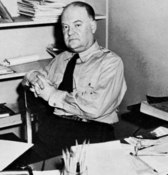
Not only did David Sedaris include one of Jean Thompson’s short stories in his anthology of personal favorites, he was so smitten with her first collection that he sold copies on his own book tour.
Proselytizing feels effortless when you love a work of fiction. But at least as often, writers are asked to blurb things they’re not wild about or read manuscripts on impossibly short notice or participate in dreary and interminable luncheons, and their responses to those requests are trickier than, but just as telling as, spontaneous outpourings of support. Below Thompson, whose Throw Like a Girl appears next week, reflects on the realities of the writerly favor economy.
 In his later years, the writer and critic Edmund Wilson (at right) famously responded to unsolicited requests with an engraved card, reading, in part, “Edmund Wilson regrets it is impossible for him to: Read manuscripts, Write articles or books to order, Make statements for publicity purposes, Do any kind of editorial work, Judge literary contests, Give interviews, Conduct educational courses, Deliver lectures, Give talks or make speeches…” The list goes on for some time, since Mr. Wilson wished to be exhaustively complete about all the things it was impossible for him to do.
In his later years, the writer and critic Edmund Wilson (at right) famously responded to unsolicited requests with an engraved card, reading, in part, “Edmund Wilson regrets it is impossible for him to: Read manuscripts, Write articles or books to order, Make statements for publicity purposes, Do any kind of editorial work, Judge literary contests, Give interviews, Conduct educational courses, Deliver lectures, Give talks or make speeches…” The list goes on for some time, since Mr. Wilson wished to be exhaustively complete about all the things it was impossible for him to do.
You have to admire the pure crankiness of such blanket refusal, and Wilson’s unwillingness to be a professional good sport about favor-mongering. Because for most of us, to be a writer is to be part of the favor economy, the business of asking, dispensing, and trading them. We acquire and we bestow the jacket blurbs, reviews, and recommendations that are the currency of book publishing. One does what one must, and whether one regards it as a necessary evil or a necessary good probably depends on one’s own position in the food chain.
I like to think that what goes around comes around. Over the years, as a teacher of writing, I’ve generated quantities of recommendations — measurable in bushels or perhaps bales — for students needing admission to graduate school, or fellowships, or jobs. I’ve blurbed books for friends and for strangers, and in turn I’ve been the recipient of generous words from, among others, David Sedaris, Kent Haruf, and Rick Russo. I’ve been happy to recommend promising writers to editors and agents and I’ve often benefited from the same sort of reciprocal good will. At best, the favor economy is about the sharing of enthusiasm. At worst, it can leave you feeling craven, unworthy, and paranoid.
When it comes to jacket blurbs, if you’re lucky, your editor will contact the target of your intentions and make the request. The editor can then either relay the happy news or buffer the bad. You yourself are spared having to interpret the silence of the oracle, wondering if a message has gone astray, or if non-response is simply refusal. If you’re not lucky, of course, you have to manage the business yourself. You summon all your language skills in an attempt to be respectful without seeming obsequious, confident without seeming presumptive, charming rather than desperate. There are no guidelines or formulas for writing a successful letter of supplication, but if you feel a kind of nausea at your own artfulness, you’re probably coming close.
And what do you do when the tables turn, when you’re the one being solicited, and for whatever reason the request is unwelcome? That’s a different type of nausea.
Strangers can be ignored, or given the Edmund Wilson treatment, but these are usually not strangers. They are friends, or friends of friends, or spouses of friends, or long-lost acquaintances (often very long and very lost indeed). They have written works you hesitate to endorse, for one reason or another. The book is just not your thing, or is lacking in artistry, or perhaps you have been importuned, as I once was, by a young writer who claimed to have almost but not quite studied with me, and meanwhile here was his upcoming book, and because of his editor’s criminal negligence no one had blurbed it, and since the deadline was imminent, could I take a look at the manuscript and send him some praise via FedEx overnight?
I couldn’t and I didn’t. I confess that I’ve evaded and ignored and made my share of feeble excuses. Blurber or blurbee, the favor economy makes cowards of us all. Yes is a blessing, No is most often an apology, since the still, small voice within us is probably saying that the writer you kick in the head today might hold the whip hand tomorrow. The robust ghost of Mr. Wilson sneers. The man knew how to say No, but he gave out his fair share of Yes as well. We shouldn’t forget that, as literary critic of the New Republic, he helped bring to the world’s prominent attention a couple of writers named Hemingway and Fitzgerald.
Image of Jean-François de Troy’s la Lecture de Molière taken from the University of Montreal site.